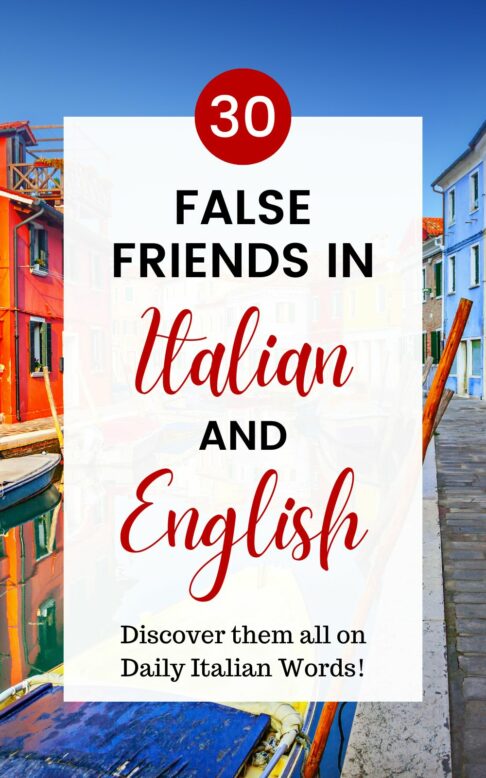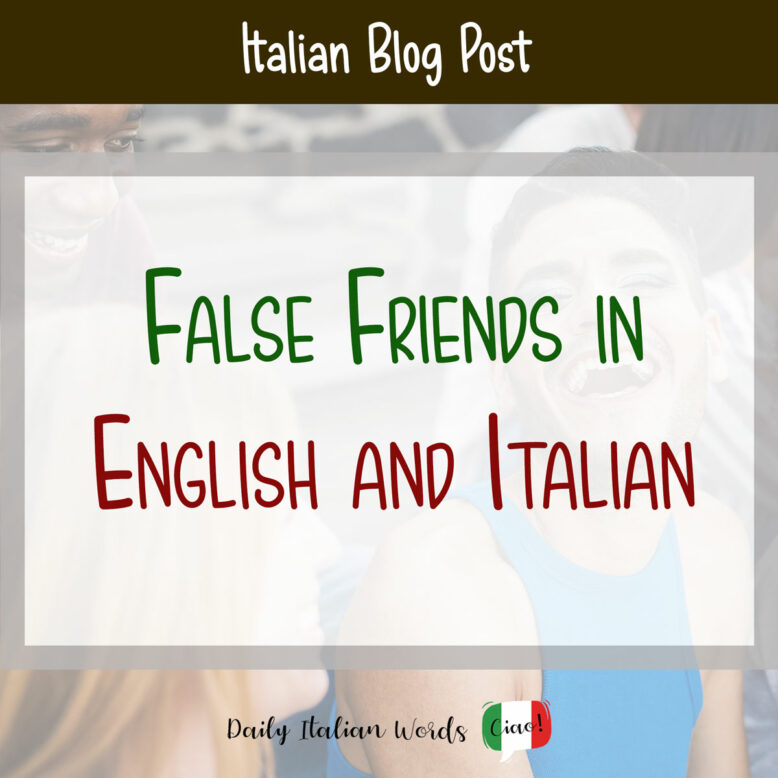False friends are words in different languages that sound or look the same but have completely different meanings.
Although the vast majority of words that resemble each other in English and Italian do share a similar meaning due to their shared origin, there are a number of false friends that will certainly catch you out – and probably cause you some serious embarrassment – at some point on your language learning journey!
The thirty I’ve included in this article are those that my Italian husband and I occasionally mix up to this day, usually when we’re sleep deprived or have had a bit too much to drink! 😉

List of False Friends in English and Italian
1. Accidente vs accident
accidente = mishap, sickness, seizure, fit
accident = incidente, infortunio
Per poco non mi è venuto un accidente!
I almost had a fit!
2. Argomento vs argument
argomento = topic, subject, theme, evidence
argument = discussione, litigio
Non capisco bene questo argomento.
I don’t understand this topic well.
3. Attualmente vs actually
attualamente = currently
actually = in realtà / in effetti
Attualmente lavoro fino alle 17.
I currently work until 5pm.
4. Baracca vs barrack
baracca = shack
barrack = caserma
Quella baracca non durerà molto.
That shack won’t last long.
5. Bimbo vs bimbo
bimbo = child, little boy
bimbo = oca giuliva
Il bimbo era molto carino.
The little boy was very cute.
6. Camera vs camera
camera = room
camera = macchina fotografica
Vai in camera tua!
Go to your room!
7. Cauzione vs caution
cauzione = deposit, bail
caution = cautela
In albergo ci hanno chiesto una cauzione.
The hotel asked us for a deposit.
8. Confrontare vs confront
confrontare = to compare
to confront = affrontare
Voglio confrontare i prezzi delle due macchine.
I want to compare the prices of the two cars.
9. Conveniente vs convenient
conveniente = good value, suitable, appropriate, advantageous
convenient = comodo
Cercate un’auto ad un prezzo conveniente?
Are you looking for a car at a good price?
10. Delusione vs delusion
delusione = disappointment
delusion = illusione, allucinazione
La festa è stata annullata…che delusione!
The party was cancelled…what a disappointment!
11. Educazione vs education
educazione = good manners, upbringing
education = istruzione, insegnamento, pedagogia
Note: educazione can mean education when referring to specific subjects of study (e.g. educazione civica = civic education; educazione artistica = art education) or when referring to one’s moral or cultural education.
Vedo che hai avuto una buona educazione.
I see that you received a good upbringing.
12. Estate vs estate
estate = summer
estate = tenuta
Dove andrai quest’estate?
Where are you going this summer?
13. Eventualmente vs eventually
eventualmente = possibly, if need be
eventually = finalmente, prima o poi
Eventualmente potremmo organizzare una visita.
We could possibly organise a visit.
14. Fattoria vs factory
fattoria = farm
factory = fabbrica
Vive in una fattoria.
He lives on a farm.
15. Lettura vs lecture
lettura = reading
lecture = lezione
Buona lettura!
Happy reading!
16. Libreria vs library
libreria = bookshop
library = biblioteca
Compriamo un libro in libreria.
We’re buying a book at the bookstore.
17. Magazzino vs magazine
magazzino = warehouse
magazine = periodico, rivista
Ero al magazzino quando ha chiamato Elena.
I was at the warehouse when Elena called.

18. Marmellata vs marmalade
marmellata = jam
marmalade = marmellata di agrumi / marmellata d’arance
It took ages for my husband to stop buying me jars of strawberry jam from the store instead of my beloved marmalade!
La marmellata mi piace più del miele
I like jam more than honey.
19. Morbido vs morbid
morbido = soft
morbid = morboso
Questo peluche è molto morbido.
This stuffed toy is very soft.
20. Noioso vs noisy
noioso = boring
noisy = rumoroso
Questo film è molto noioso.
This film is very boring.
21. Parenti vs parents
parenti = relatives
parents = genitori
During my first year in Italy, I asked my mother-in-law if she was happy for my parenti to visit. She responded by saying “How many of them?”
Vengono i tuoi parenti a casa nostra questo weekend?
Are your relatives coming over to our house this weekend?

22. Pavimento vs pavement
pavimento = floor
pavement = marciapiede, strada asfaltata
Sono scivolato sul pavimento.
I slipped on the floor.
23. Preservativo vs preservative
preservativo = contraceptive, condom
preservative = conservante
I once asked my Italian mother-in-law if it was necessary to add a preservativo to the stock she was preparing. The look she gave me was priceless!
In farmacia vendono i preservativi.
They sell condoms at the pharmacy.
24. Pretendere vs pretend
pretendere = to expect, presume, demand, insist
to pretend = fare finta, fingere
Non puoi pretendere che loro facciano tutto.
You can’t expect them to do everything.
25. Ricordo vs record
ricordo = memory, recollection
record = nota, documento, disco, vinile
Ho un bel ricordo di questo posto.
I have a good memory of this place.
26. Romanzo vs romance
romanzo = novel
romance = storia d’amore
Ho appena finito di leggere questo romanzo.
I just finished reading this novel.
27. Rumore vs rumour
rumore = noise, sound
rumour = pettegolezzo, voce diffusa
Non fare troppo rumore!
Don’t make too much noise!
28. Stampa vs stamp
stampa = press, print, printing
stamp = francobollo
Dovrai dire tutto alla stampa.
You’ll have to tell the press everything.
29. Asse vs ass
asse = axis, plank, board
ass = culo, asino
Le assi del ponte sono marce.
The boards of the bridge are rotting.
30. Testo vs test
testo = text, lyrics
test = esame
Mi piace il testo di questa canzone.
I like the lyrics of this song.
Have you ever been tripped up by a false friend in Italian? Tell us about your experience in the comments below!

Heather Broster is a graduate with honours in linguistics from the University of Western Ontario. She is an aspiring polyglot, proficient in English and Italian, as well as Japanese, Welsh, and French to varying degrees of fluency. Originally from Toronto, Heather has resided in various countries, notably Italy for a period of six years. Her primary focus lies in the fields of language acquisition, education, and bilingual instruction.


